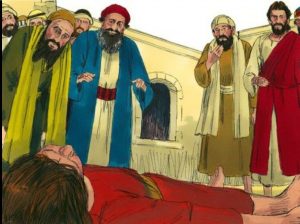
Mark 9:22 AV
And ofttimes¹) it hath cast² him into the fire,
and into the waters³,
to destroy⁴ him:
but if thou canst⁵ do any thing,
have compassion⁶ on us,
and help⁷ us.
¹) Often, frequently.
²) To throw or let go of a thing, without caring where it falls. So this boy was nonchalantly thrown into the fire, or into the water, by this evil spirit.
³) Tis points to the water in rivers, in fountains, or in pools, it can even point to the waves of the sea.
⁴) The purpose of satan (John 10:10)
⁵) To be able, have power whether by virtue of one’s own ability and resources, or of a state of mind, or through favourable circumstances, or by permission of law or custom; to be able to do something; to be capable.
⁶) To be moved as to one’s bowels, hence to be moved with compassion, have compassion (for the bowels were thought to be the seat of love and pity).
⁷) Bring aid.
Other translations
And Jesus said, [You say to Me], If You can do anything? [Why,] all things can be (are possible) to him who believes! [AMP] And Jesus said to him, "If you can! All things are possible for one who believes." [ESV] Jesus said unto him, If thou canst believe, all things are possible to him that believeth. [KJV] "'If you can'?" said Jesus. "Everything is possible for him who believes." [NIV] "What do you mean, 'If I can'?" Jesus asked. "Anything is possible if a person believes." [NLT] Jesus said to him, "If you can believe, all things are possible to him who believes." [NKJV]
Some further information
The evil spirit is after the life of the boy and tries to take his life in all possible ways (by burning, or drowning). The boy’s body must therefore also be marked.
A characteristic of the powers of darkness is that they are destructive, they seek to destroy what God has made (Mark 5:4,5; Luke 8:29, compare 1 Peter 5:8).
The father therefore also desperately appeals to Jesus’ mercy (cf. Mark 6:34), also with regard to himself (“help us” and “have pity on us”), but still doubts whether after the failure of the disciples is still at the right place: “if you can (do) something”.
but if thou canst do anything, have compassion on us, and help us
“Us,” says the father; for it was a sore family affliction.
Compare the language of the Syrophoenician woman regarding her daughter, “Lord, help me.”
Still nothing is done: the man is still struggling in faith: it must come a step farther. But he had to do with Him who breaks not the bruised reed, and who knew how to inspire what He demanded.
Now let us reflect on this
Jesus suffers from the bitter reality of life. He is surrounded by darkness and unbelief.
The sick boy’s father clings to Him: If You can do anything, help us.
He asks for mercy.
Perhaps this is also how you ended up praying to the Christ at the end of your strength. Then you can only plead on His mercy.
▪︎ But can He help?
▪︎ Is the need not too great?
▪︎ Is there still hope?
Doubt and faith compete for precedence.
Whoever prays for a husband or wife, child or grandchild, feels the solidarity: Lord help us.
It is amazing that you can always turn to Him again.
He provides healing, not only for sickness, but above all for the ailment of your heart.
Then we learn: He cannot just do anything, but He can do everything!
Twitter: @SchoemakerHarry
Website 1: https://devotionals.harryschoemaker.nl
Website 2: http://bijbelplaatjes.nl



